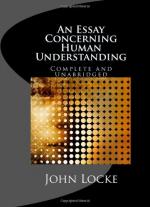
|
| Name: _________________________ | Period: ___________________ |
This test consists of 5 multiple choice questions, 5 short answer questions, and 10 short essay questions.
Multiple Choice Questions
1. How does Locke characterize perception?
(a) Self-aware.
(b) Complex.
(c) Incomplete.
(d) Basic.
2. What does Locke claim separates mankind from all other creatures on earth?
(a) Language.
(b) Compassion.
(c) Understanding.
(d) Envy.
3. How does Locke use garlic to illustrate his argument about the qualities of things?
(a) Garlic has cleaning properties in addition to nutritional uses.
(b) Garlic has many different stages of development.
(c) The taste is different if it is cooked.
(d) Different cultures use it for different things.
4. To what does Locke attribute the ability to create technology and to organize our environment?
(a) Science.
(b) Perception.
(c) Reason.
(d) Sensitivity.
5. What happens to a particular idea when you practice abstraction?
(a) You see the opposite of the idea.
(b) You subtract particulars.
(c) You use it for religious purposes.
(d) You see it in context.
Short Answer Questions
1. What does Locke say number indicate about a thing?
2. How does Locke define perception?
3. What is substance, according to Locke?
4. What does Locke use an example to illustrate mode?
5. What does Locke describe in Book II?
Short Essay Questions
1. How does Locke use the concept of number in his discussion of primary qualities?
2. How is duration developed from simple ideas, according to Locke?
3. What benefits do humans receive from understanding, according to Locke?
4. What arguments does Locke make against Descartes' philosophy?
5. What does Locke set out to do in Book II?
6. How does Locke define retention?
7. How does Locke define the faculty of perception?
8. How does Locke define discerning?
9. What arguments does Locke make against innate knowledge?
10. What aspect of knowledge does Locke exclude from "Essay Concerning Human Understanding"?
|
This section contains 668 words (approx. 3 pages at 300 words per page) |

|




